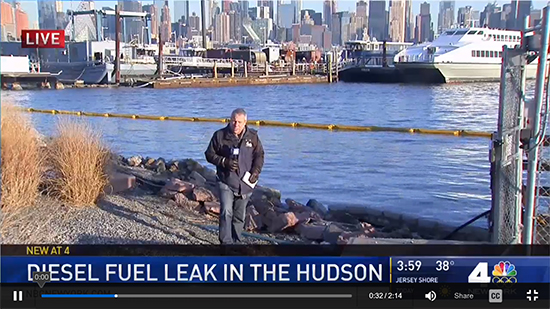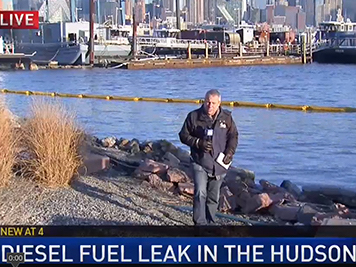The April 4 NJ Transit Board meeting scheduled for 2 pm has been cancelled after an agreement was struck between Hoboken Mayor Ravi Bhalla and Governor Murphy. The City of Hoboken will rescind its eminent domain ordinance on April 3 as part of the deal. State and City of Hoboken will work to identify alternate site for locating NY Waterway home port.
By Ron Hine | FBW | March 8, 2018
On November 3, 2017, NY Waterway purchased the 8-acre property at 901 Sinatra Drive from Union Dry Dock & Repair Co. for $11.5 million. This news stunned local officials who had no previous knowledge of this sale and the plans for NJ Transit to, in turn, acquire the site and lease it back to NY Waterway. The ferry company proposes to use this prime Hoboken waterfront real estate for a highly polluting, industrial use.
1) Wouldn’t this allow for greater ferry access from New Jersey to Manhattan?
No. This is not a ferry terminal. It is a depot to be used for refueling, repairs, storage and sanitary wastewater disposal for NY Waterway’s fleet plus parking for 150 cars of NY Waterway employees. There is no planned additional ferry line from midtown Hoboken to New York City.
2) Isn’t NY Waterway’s operation a continuation of what Union Dry Dock & Repair Co. did?
No. Union Dry Dock’s two slips were used for barge repair, not refueling. Because the barges took weeks to repair, there was very little traffic to and fro. The barges had no engines and needed no fuel. A small crew of employees worked 8-hour shifts, 5 days a week. By contrast, NY Waterway plans to operate 18 hours a day, 7 days per week, making an estimated 80 ferry trips daily to and from the depot. The high-speed ferries consume huge quantities of diesel fuel, requiring frequent refueling. The City estimates that ferry crews will be making 240 vehicular trips through Hoboken to and from this waterfront site; delivery of fuel and supplies will add considerable more traffic, turning Sinatra Drive into an industrial boulevard.
3) Would the diesel fumes pose a hazard to the existing residential, recreational and educational uses in the immediate neighborhood?
Yes. Most of the NY Waterway ferries operate with Tier 1 marine diesel engines, the most polluting class of diesel engines. According to the Union of Concerned Scientists, diesel fuel and its exhaust can contain hundreds of chemical elements, including sulfates, ammonium, nitrates, elemental carbon, condensed organic compounds, and even carcinogenic compounds and heavy metals. The fouled air will pose a health risk to all those in the area, especially nearby residents at Castle Point Terrace and Maxwell Lane, and students and faculty at the campus of Stevens Institute of Technology.
4) NY Waterway says this is the only place available to locate its refueling, repair & storage depot. Is this true?
No. NY Waterway completed a study of alternate sites to locate a ferry depot, yet they have not shared this information with the City of Hoboken despite a request from the mayor. Bayonne — with its working waterfront — has expressed interest in the operation, and other working waterfronts in Jersey City, Staten Island and Brooklyn are located near NY Waterway’s southern routes. Currently, NY Waterway does not concentrate all of its refueling, repairs, storage and disposal of sanitary wastewater at one location, nor is there a compelling reason to do so in the future. There are other sites that would be appropriate for refueling that would not have the same negative impacts, some centrally located.
5) Hoboken has plenty of parks so it doesn’t need any more, right?
Currently, there are only .68 acres of park for every 1,000 Hoboken residents. This is well below New York City’s standard of 2.5 acres and the national standard of 6.25 to 10.5 acres of parkland per 1,000 residents. As residential and commercial development continues at a healthy pace in Hoboken, the opportunities to add open space are rapidly disappearing. Completing the waterfront park at the former Union Dry Dock site would add over 3 acres of public parkland – a 10% increase in Hoboken’s public open space inventory – and provide a critical link from Castle Point Park to Maxwell Place Park. As evidenced by the remarkable success of NYC’s Highline, a fully connected, undeniably public park along Hoboken’s waterfront from end to end would make Hoboken a model for other waterfront communities, not only providing open green space but developing a resource that will benefit the public for generations to come.
6) Can the City of Hoboken afford to purchase the site from NY Waterway for nearly $12 million?
Yes. In 2008, Hoboken voters overwhelmingly approved an Open Space Trust Fund that provides a dedicated annual revenue stream for acquisition of public open space. Nevertheless, since waterfront development began in the 1990s, the City of Hoboken has spent very little local tax-levy funds for acquisition and construction of its waterfront parks. Tens of millions of the funding has come from the Port Authority of NY and NJ; state grants from Green Acres and the NJDOT; federal grants from the USDOT (multiple years), HUD, and the American Resource and Recovery Act; and the Hudson County Open Space Trust Fund. At the north waterfront, private developers have been required to build their portion of the Hudson River Waterfront Walkway as a requirement of their NJDEP waterfront permits. There are other creative approaches that the City can take to fund the acquisition of Union Dry Dock and the building of a 3-acre park there, thus avoiding any additional local tax burden. In March 2011, the City Council authorized a $20 million bond that would be paid off through revenue from the City’s Open Space Trust Fund that can be used for the acquisition of the former Union Dry Dock site.

On January 26, 2018, Channel 4’s Brian Thompson reported on NY Waterway’s 300 gallon fuel spill in Weehawken where 1/3 of the diesel fuel found its way into the Hudson River.
7) What about the current recreational uses along and in the Hudson River near the site?
The Hoboken Community Boat House just north of Union Dry Dock sponsors free kayaking lessons from June to September, serving over 6,000 paddlers per season. Resilience Paddle Sports, a Hoboken-based nonprofit, provides kayaking and paddleboarding plus environmental programs for children at Pier 13 and the Hoboken Cove. In August 2016, the New York Times reported that a NY Waterway ferry collided with a group of kayakers on the Hudson River near West 39th Street in Manhattan. Ten kayakers were rescued, five of whom were injured. This hazard along with the frequent wakes and air pollution from diesel fumes would likely put an end to kayaking, to the public fishing on the pier just to the south, and to the skateboard park frequented by children and young adults beside the site
8) Isn’t this ferry depot harmless to the marine life in the river?
No. NY Waterway’s fleet of 34 ferries will be refueled, repaired, cleaned and pumped empty of sanitary wastewater, leading to inevitable spills. In fact, just this past January, NY Waterway spilled over 300 gallons of diesel fuel one-third of which flowed into the Hudson River at its Weehawken refueling site. NY Waterway’s use of the term “homeport” to describe this operation belies the industrial nature of the work they’ll perform there: repairs require the use of hydraulic fluids, oils and lubricants, and the milling and grinding of the metal ferry hulls discharges aluminum shavings, all of which pose a serious threat to the diverse wildlife habitat at this site. This habitat will be further disturbed by the wakes and turbulence generated by the high speed ferries. The natural sand beach to the north of the former Union Dry Dock property is sited in an intertidal zone that plays a critical role in the area’s marine ecosystem. The horseshoe crab lays its eggs at this beach that are a vital food source for migrating shorebirds, and the small cove is is also home to the diamondback terrapin. The NJDEP has classified certain migratory fish as “species of concern” including striped bass, sturgeon, American shad and blueback herring, all of which are all found in this area of the Hudson River.
9) Isn’t it an abuse of power for the City to exercise eminent domain at this site?
Under normal circumstances, acquiring a site such as this for public purposes would be done without the City resorting to condemnation proceedings. But the NY Waterway acquisition and negotiations with New Jersey Transit to become the ultimate owner were all conducted behind closed doors without notifying local officials or providing a public comment period. NY Waterway is now moving equipment to the site without first obtaining permits from the NJDEP and Army Corps of Engineers, and has ignored the overwhelming opposition from local residents and public officials. At this point, the City’s use of eminent domain may be the only tool available to prevent an unwanted and undesirable use of this part of Hoboken’s beloved waterfront.
If you have an additional question, let me know & I will respond. For additional information, click on the “related links” below.
Related Links
City to make offer to buy Union Dry Dock
City Council faced with standing room only crowd urging completion of waterfront park
15 environmental organizations urge Gov. to preserve Union Dry Dock as public space
3,000-year old outrigger canoe tradition lives on at the Hoboken Cove
NY Waterway’s improbable tale of eviction from Weehawken’s waterfront
Union Dry Dock is not an option for a ferry homeport but other sites are
FAQs on the ferry diesel depot proposed for Union Dry Dock site
NY Waterway lobbyists pressed Murphy administration to reverse course on Union Dry Dock
NY Waterway’s bogus talking points
The Life and Death of the Hoboken Cove
Hoboken mounts challenge to Army Corps/NJDEP permits
NJ Transit study identifies 5 sites more suitable than Union Dry Dock
FAQs: We answer your questions on NY Waterway depot in Hoboken
A brief history of NY Waterway and its founder, Arthur Imperatore
Tell NJ Transit Board to vote ‘no’ on MLK Day
Ferry homeport would reverse decades of progress at Hoboken waterfront
Public Park or Refueling Depot?
FBW letter opposing NJDEP permit application
NJ Transit’s dreadful plan for Hoboken waterfront
In 2012, NJ Transit abandons plans to acquire Union Dry Dock
FBW petition underscores Hoboken’s love of its waterfront
Union Dry Dock: Potential Parkland for Sale


